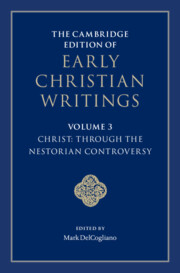Book contents
- The Cambridge Edition of Early Christian Writings
- The Cambridge Edition of Early Christian Writings
- The Cambridge Edition of Early Christian Writings
- Copyright page
- Contents
- Notes on Contributors
- Acknowledgments
- Note on the Texts and Translations
- Abbreviations
- Series Introduction
- Introduction
- Part I The Beginnings of Christology
- Part II Developing Christological Traditions
- 13 Tertullian, Apology 21
- 14 Tertullian, On the Flesh of Christ 1–16 and 24–25
- 15 Tertullian, Against Praxeas 1–4 and 27–30
- 16 Origen, On First Principles 2.6
- 17 Paul of Samosata, Selected Fragments
- 18 Aphrahat, Demonstration 17: On the Son
- 19 Hilary of Poitiers, On the Trinity 9.1–14
- 20 Ephrem the Syrian, Hymns on Faith 4, 10, 24, 31, 36, 51, 54, 77, 78, and 79
- Part III Traditions of Pro-Nicene Christology
- Part IV Controversy over Nestorius
- Suggestions for Further Reading
- Scriptural Index
13 - Tertullian, Apology 21
from Part II - Developing Christological Traditions
Published online by Cambridge University Press: 05 February 2022
- The Cambridge Edition of Early Christian Writings
- The Cambridge Edition of Early Christian Writings
- The Cambridge Edition of Early Christian Writings
- Copyright page
- Contents
- Notes on Contributors
- Acknowledgments
- Note on the Texts and Translations
- Abbreviations
- Series Introduction
- Introduction
- Part I The Beginnings of Christology
- Part II Developing Christological Traditions
- 13 Tertullian, Apology 21
- 14 Tertullian, On the Flesh of Christ 1–16 and 24–25
- 15 Tertullian, Against Praxeas 1–4 and 27–30
- 16 Origen, On First Principles 2.6
- 17 Paul of Samosata, Selected Fragments
- 18 Aphrahat, Demonstration 17: On the Son
- 19 Hilary of Poitiers, On the Trinity 9.1–14
- 20 Ephrem the Syrian, Hymns on Faith 4, 10, 24, 31, 36, 51, 54, 77, 78, and 79
- Part III Traditions of Pro-Nicene Christology
- Part IV Controversy over Nestorius
- Suggestions for Further Reading
- Scriptural Index
Summary
Little is known with certainty about the life of Tertullian, who authored some of the very earliest Christian literature written in Latin. He was from the city of Carthage in Roman North Africa, and his literary career in this city spanned from roughly 196 to 212; he was perhaps born around 170. From the few scattered comments he made about his own life, we learn that he was raised as a pagan, and became a Christian under unknown circumstances. Most scholars now doubt other details about Tertullian’s life which come from later sources, such as Jerome’s belief that his father was a Roman centurion, and Eusebius’s suggestion that he was a lawyer in his pre-Christian career. One further point from Jerome about Tertullian’s life likewise requires cautious treatment. This is the claim that Tertullian in middle age “lapsed” away from the catholic church into Montanism, a revivalist movement of Christianity established in the second century and eventually branded as heretical.1 Though Tertullian’s later works do show increasing signs of Montanism, it is impossible to divide up his career neatly into catholic and Montanist phases, as previous generations of scholars tended to do.
- Type
- Chapter
- Information
- The Cambridge Edition of Early Christian Writings , pp. 137 - 143Publisher: Cambridge University PressPrint publication year: 2022

